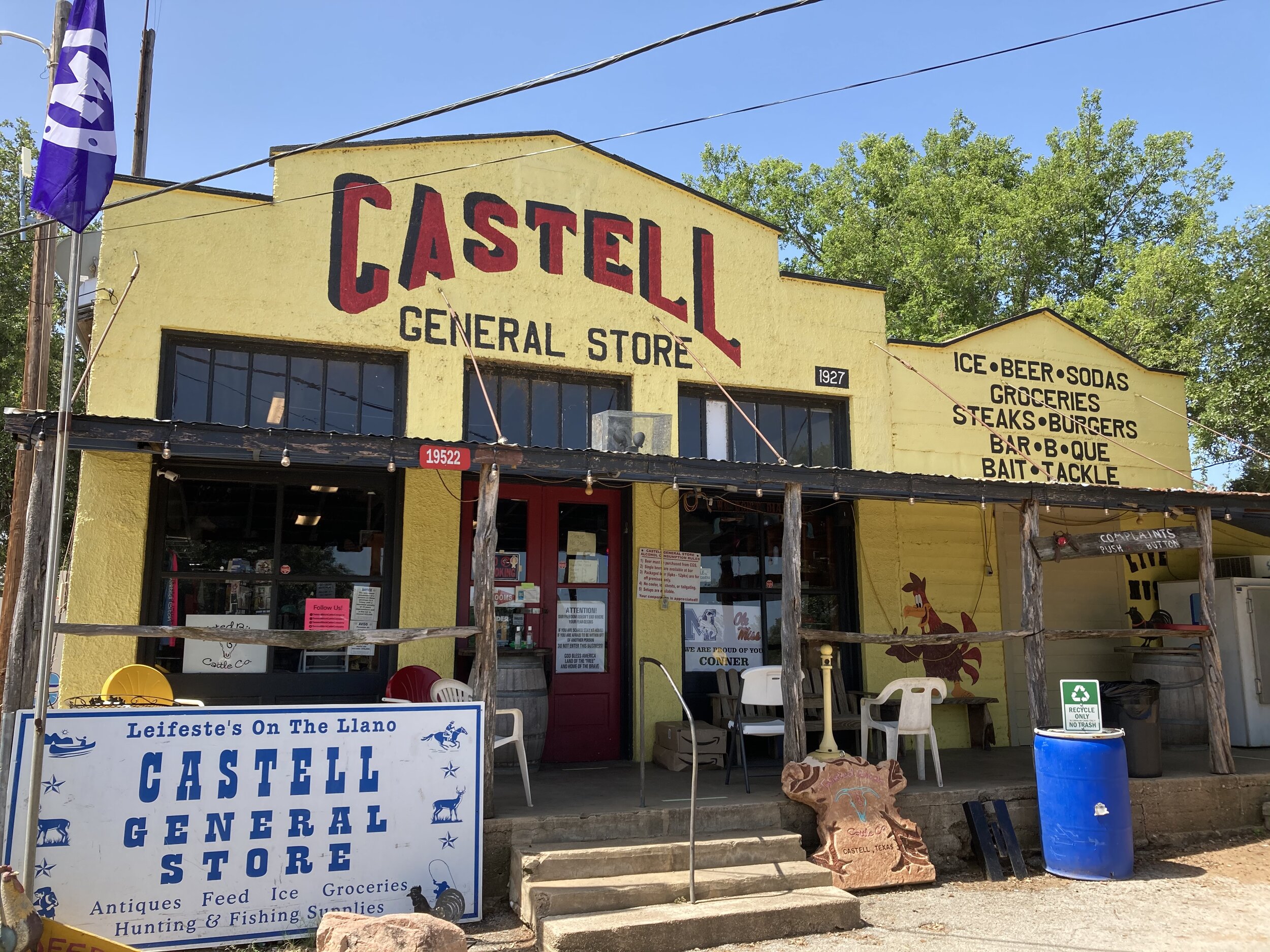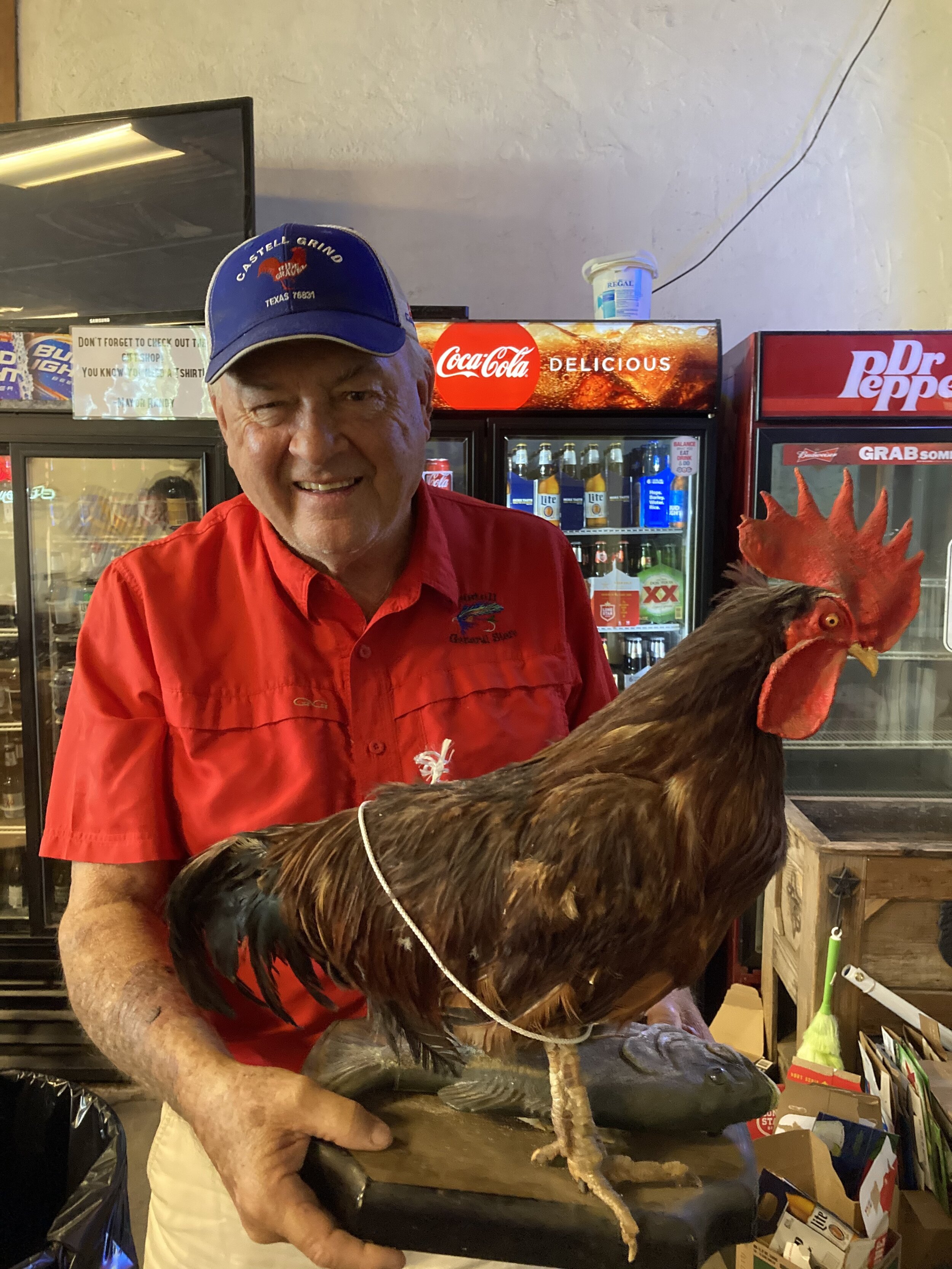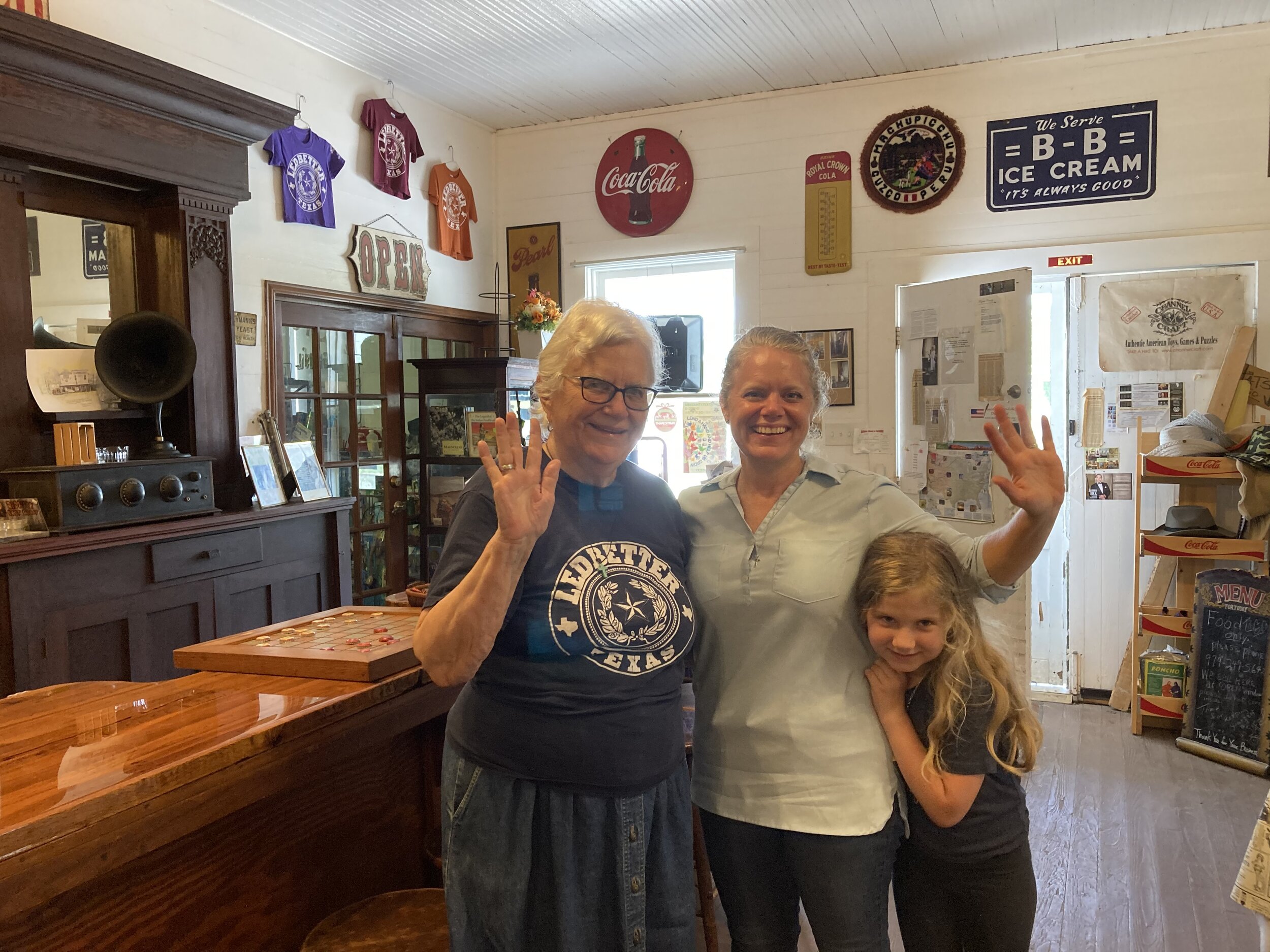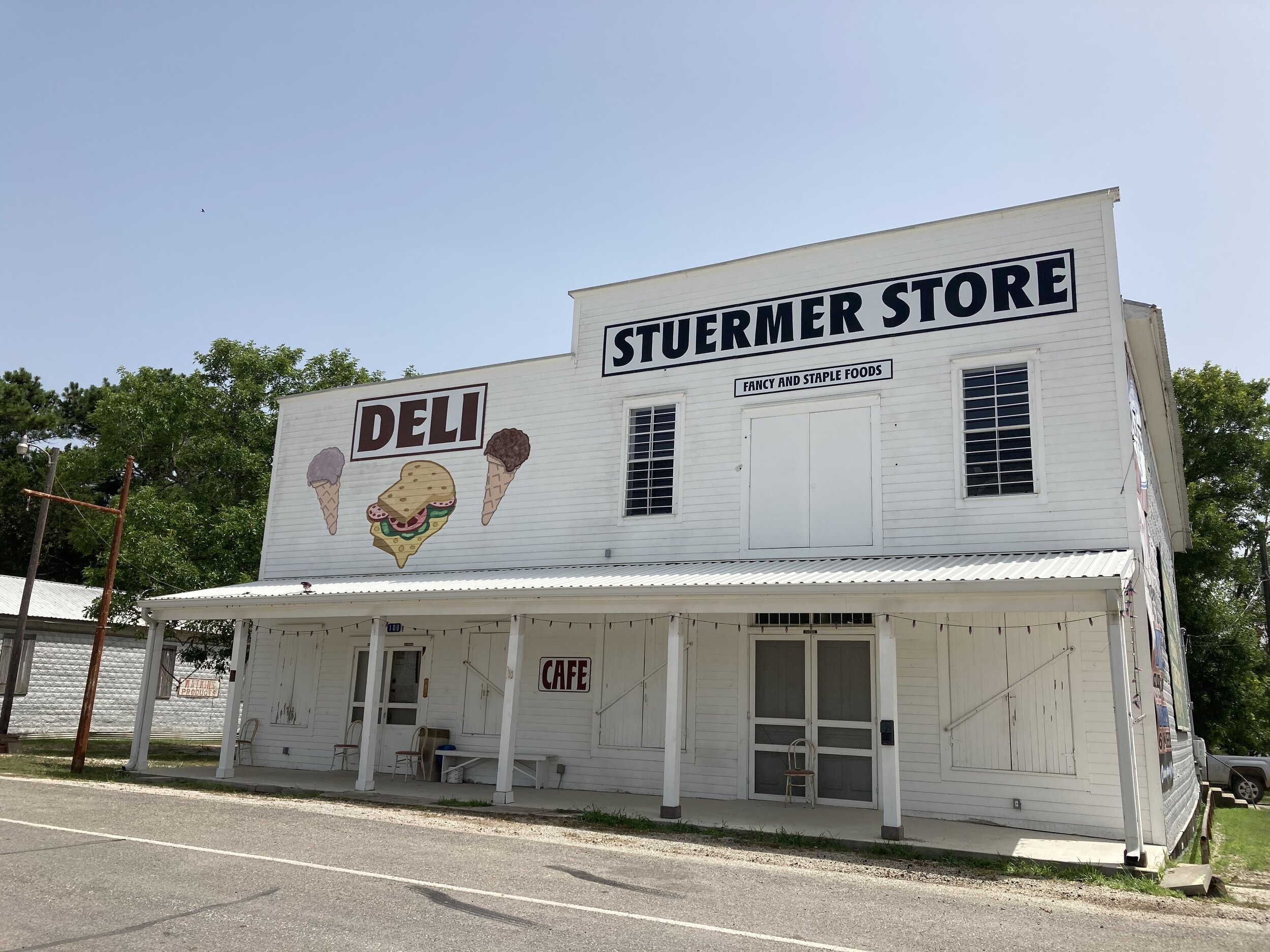9 - Postcards from Country Stores, “Crassness in Castell, Legacies in Ledbetter”
The Castell and Stuermer Stores are separated by about one hundred and sixty miles and sit on opposite ends of Central Texas. Their hours can hardly be described as regular, nor do they boast expansive aisles dedicated to rice, face wash, or Greek yogurt. Yet, they help bridge the past of the communities they serve to our present, and provide spaces for fellowship that are essential for different, but important reasons. We'll learn about why this is by sitting down with their respective owners who share stories both touching, humorous and wild- One of which, the tale of a certain rooster, is unlike anything we've ever heard before or since...
TRANSCRIPT
(As this transcript was obtained via a computerized service, please forgive any typos, spelling and grammatical errors)
________________________________________________________
Evan (00:00):
Over the past year, thanks to the strange realities of what I call the 'Rona, grocery stores and their hardworking staffs have rightly been recognized as essential. And while I love my meal kit service, and I'm grateful it's now easier than ever to get items delivered, supermarkets and corner bodegas are things I just don't ever see going away. If you've ever inadvertently started to run low on toilet paper, you know what I'm talking about. But the two small town stores we're going to visit today, on opposite ends of Central Texas, don't sell slabs of meat or have aisles dedicated to rice or face washes. The hours they keep can also hardly be described as regular. Yet, they help bridge the past of the communities they serve to our present and provide spaces for fellowship that I'd argue are essential for different, but important reasons. I'm Evan stern. And this is Vanishing postcards.
New Speaker (01:55):
Some places just have a certain draw to them. I'm privileged enough to have traveled the world. And yet, I always find myself coming back to the Hill Country. I'm not alone in this. Waylon and Willie famously immortalized this region by singing of fleeing the successful life to Luckenbach, Texas, a tiny town with little more than a general store and dance hall. It's been years since I've been to Luckenbach and hear on the surface, it looks much as it always has. But when it comes to getting back to the basics, know instinctively, I have to go a bit further. And today standing on the banks of the Llano river off a remote back road in the hamlet of Castell, know I've happened upon something different. I'm surrounded by post oak, chirping, birds and cicadas, and feeling the water drift over my toes can see why, despite the threat of Comanche raids and unforgiving climate, a group of German settlers once saw in this spot, the potential for utopia,
Randy Lefeiste (03:00):
It was a group of socialistic, freethinkers in Germany. They came over here. They were aristocrats. They came over here and tried to create a socialist type environment. And they did. Leningrid down the river, Patina down the river and Castell is the only one that survived
Evan (03:19):
Randy Lefeiste came from these people and grew up right here on a ranch that's been in his family's hands since 1851. And when I ask him why this picturesque village near the border of Llano and Mason counties is the only one of these settlements left, he credits his lineage-
Randy Lefeiste (03:36):
Cause it was, it was my great, great, great grandfather. And he was a tough little SOB.
Evan (03:42):
I don't know Randy well enough to tell how tough an sob he is, but he definitely isn't a socialist. In addition to a decades long career in cattle and real estate, he dabbled in Republican politics, is vocal in his disdain for Austin liberals and proudly shows me a photo of himself with George W. Bush. But he's clearly following in his grandfather's footsteps as he's almost, single-handedly given this once dying community, a new lease on life.
Randy Lefeiste (04:14):
This was a ghost town. Sold all these properties around here. We now have eight bed and breakfast. This is a boom town, everybody just has fun. Population is 6- that's it!
Evan (04:27):
We're sitting in the shade at a picnic table in front of The Castell General Store. It was built in the late twenties and sat a bit further up the road before Randy bought it, painted it yellow and moved it to this bluff above the river back in 2002. But historical purists should hold their huffing and puffing because everything about this place just seems right. They've got bait, tackle, burgers, a fridge stocked with cold beer and the spot's just honest and peaceful. Though, Randy tells me the crowds can come out here in force
Randy Lefeiste (05:03):
And we have goat cook-offs, we have chili cook-offs. We have gumbo cook-offs. We have live music. Our biggest event is Testicle Festival. There's 500 people come out here and have a ball- or two.
Evan (05:17):
And how did The Testicle Festival get started?
Randy Lefeiste (05:22):
I dreamed it up. When I was castrating calves.
Evan (05:27):
Strangely, though, The Testicle Festival actually isn't even what's gotten The Castell Store the most attention.
Randy Lefeiste (05:34):
Okay. Cock-a-Roo. Girlfriend and I were in Cabo San Lucas. We saw a rooster at a bar. I said, "I need a rooster for the store." She goes to Kerrville, buys me this $5 rooster. Having him over here and he's running around. She raised him from a chic. Had a Billy Bass- one of those things that flop around and play music. He went over and pecked on the red button and jumped on Billy Bass and started having sexual relations with him. You can Google Castell rooster and see videos. So newspapers, magazines, TV stations, Houston, Dallas, Austin. They all came out here. Hundreds of thousands of people would come out here and see my rooster perform, like 20 times a day. All these people came here. I did nine real estate deals directly related to that. I made $252,000. So the moral to the story is if you want to be successful, you got to have a big... Rooster.
Evan (06:35):
At this, he leads me inside the store, takes me to the back and points to the top of the shelf.
Randy Lefeiste (06:42):
There's Cock-a-Roo right there.
Evan (06:46):
Oh my goodness. I've seen all sorts of taxidermy in my day, but this might be the very first rooster I have seen.
Randy Lefeiste (06:53):
That's probably the first one, right there.
Evan (06:55):
Well, who knows if Cock-a-Roo is the first stuffed rooster in the world, but I'm sure he's the only one mounted on top of an electronic singing bass. And it warms my heart to see these two lifelong friends united in death. And he tells me that Cock-a-Roo's passing did not go without notice.
Randy Lefeiste (07:15):
Here's an obituary. Cock-a-Roo, when he died, it was in the paper. I mean we were written up in all kinds of magazines. Here's here's another- "World Famous Rooster Dies in Castell."
Evan (07:30):
The Memorial reads- "Cock-a-Roo, Randy Lefeiste's world famous rooster from Castell was found unresponsive in his cage Friday morning, June 26th, 2009. He was rushed to the taxidermist, but efforts to revive him were unsuccessful." It then states that "A wake will be held at the Castell General Store where Cock-a-Roo will be remembered. Rooster gumbo will be served from 5:00 PM until we run out. Don't worry. It's not Cock-a-Roo. Turns out, though, this place is actually well suited for a wake because on occasion, it doubles as a church.
Randy Lefeiste (08:10):
We have church here once a month. We call it "Drinking with Jesus.' We have bloody Marys, mimosas, we have music. And we have a real good preacher. I mean, we had church last week. It was standing room only.
Evan (08:22):
Going back towards the front porch, we stop by a nook and Randy shows off a t-shirt featuring the town slogan.
Randy Lefeiste (08:30):
See we have t-shirts right here. This is one of our best selling t-shirts, "Population, 7. Our town is so small, we don't have a town drunk. So we take turns."
Evan (08:43):
Thinking of the wine cellars and high-end clothing shops I'd seen on Fredericksburg's Main Street a few days ago, I can't help but smile. This is what Luckenbach must have been like 50 years ago, but Randy insists it's superior.
Randy Lefeiste (08:59):
I think gets better than Luckenbach. Cause we got the Llano river. I go down there every evening. Got a bar of soap and shampoo on a rock. And I go down there and take a bath. Every evening. I took one last night. It ain't pretty, but I'm by myself, and I watch the sun go down. I might have, might have a little martini to go with.
Evan (09:19):
Seeing what's happened to other corners of the Hill Country, I've got to ask if he's worried about mass tourism trickling its way up. But he assures me that while he's gotten a few B and B's up and running, he and the folks around here are committed to keeping things quiet and how they like it.
Randy Lefeiste (09:35):
There's still older Germans here, come in here and speak German. And they still have the same work ethic. They don't drive fancy cars. They may be living on a $5 million ranch, but they still live their lifestyle. I've had four different people come here from California. And I said, "This is a small, tight knit German community. You need to go to Kerrville or Marble Falls. And I could have sold them real estate. I didn't do it. That's probably discrimination, but I don't care about discriminating against Californians.
Evan (10:11):
He told me earlier, he can always tell where people are from, but I think I'll hold off on revealing for now that I actually keep an apartment in Manhattan. Yet he insists the place is friendly.
Randy Lefeiste (10:24):
Oh like we give people gas. We give people everything. Someone shows up here and they don't have any money or something. I say, "You just go back to Houston, send me a check." I do it all the time. I mean like our ice machines, we don't have locks on them. We trust people. They come back, or they'll lay $5 in there. I mean, it's just, just a nice place. I learned a long time ago. If you treat people nice, it's going to be nice to be nice.
Evan (10:55):
To be fair, Randy has been nice to me and handing me his card, which is captioned "Castell General Store- Home of the Big Cock," it's clear he doesn't think this is the last time we'll be exchanging words.
Randy Lefeiste (11:09):
Yeah, you come here. Nobody comes here once they come back. That's my job.
Evan (11:15):
Oh, I'm coming back. As I said earlier, the country around here just has a certain draw.
Evan (11:22):
The town of Ledbetter sits roughly an hour east of Austin, and about 60 years behind it. Built on blackland prairie near the top of Fayette County, speeding by this town's five building main street on highway 2-90 will probably take you all of 15 seconds. And when I ask Christine Jervis to describe this community of roughly 70 souls, she cuts straight to the chase.
Christine Jervis (12:41):
It's a little town, that's just almost evaporated. If you talk about anybody in the area to somebody else in the area, you better watch it because they're probably related.
Evan (12:55):
Settled by German and Czech farmers, like many places, this was a town whose fortunes came and went with the railroad. Christine tells me that where the highway now sits was once an 18 room hotel and large depot. But after the nearby town of Giddings was able to establish itself as an intersection, most of the business picked up and moved nine miles west. The trains ceased stopping here back in the early fifties and ended service altogether in 1979. But the old timers around here still speak of them.
Christine Jervis (13:27):
They, uh, took up the track in 1987. And when they did that, they did it because they were going to widen this and make four lanes, which they did. And the track is not there. But people still from a long time ago, they say, "Well, you go across the tracks and then he goes, so and so-" And so some people will ask directions to have somebody that really isn't thinking clearly about that. And they'll come back and they'll say, "I've gone so many miles and I haven't found a track yet. And so then we have to redirect them."
Evan (14:02):
Memories don't seem to die easily in Ledbetter, but that's exactly what makes this no stoplight town remarkable. I'm sitting with Christine and her 40 something daughter, Robin at a table in the Stuermerr store, the grocery and cafe run by their family for six generations since 1890. A large two storied edifice of whitewashed wood, I'm told the space we're talking in had once been the local saloon. Taking in the oak floors, whirring antique fans, carved bar and original Coca-Cola signs, I half expect Mary Stuart Masterson to show up and offer me a plate of fried green tomatoes. Born in 43, Christine's earliest recollections here, date to the post-war years. And the picture she paints is of a rural south lost to the ages.
Christine Jervis (14:53):
And on the front porch, there were a couple of benches, like the one out there. And, uh, they would have a bunch of people that would congregate in the mornings and have their soda water, get chewing tobacco or whatever. And they would sit out there on the porch and they, the black people spoke German. And so that was because of the people they worked for. And they, they learned it from early on. They, they knew how to speak German
Evan (15:24):
Lamentably, however, as was the day's practice, she informs me that the saloon itself was segregated and later shows me an old lattice partition that was used to keep the space divided. When I ask if she remembers any of this, she tells me her uncle Ernst had closed down the bar area sometime before she was born, converting the space to a feed room and devoting all of his energy to the adjoining store, where she was put to work from the start.
Christine Jervis (15:50):
My big job of the Steurmer store was killing flies because they didn't have screen doors. And in the fifties, polio was rampant. And, uh, they weren't sure how it was spread, but they felt like the flies might have something to do with it. And so that was my big job was killing flies and I had a fly swatter and I killed a lot of flies.
Evan (16:12):
Hearing this, Robin interjects to tell me this occupation is something of a Rite of passage in the family.
Robin (16:19):
Growing up, I mean, I was just always in and out at the store and, um, you know, weekends, it was just something that we would come in and, and hang out and visit or, um, whatever. And then as I got older, um, this was my first job. And so, um, I remember killing flies too. And I was told your mom killed flies. Your grandmother killed fly. So now it's your turn to kill flies. I remember standing out on the front porch, killing flies.
Evan (16:49):
When Robin was a girl. The Steurmer was managed by her great great aunt who taken over following Ernst's death in 1966. After her, it was eventually handed over to Christine's mother, Lillian, whom they tell me, kept the doors open six days a week for nearly 30 years.
Christine Jervis (17:06):
From 1986 or thereabouts till she died in, um, 15, January 8th of 15. Uh, that Thanksgiving before is when she was pretty much- She didn't come back to the store after that.
Evan (17:23):
How old would she have been? Um, when she had to step back
Christine Jervis (17:27):
97? Well, she, she was 96 and on Christmas day she turned 97.
Evan (17:33):
Small, but energetic, Lillian chased out a colony of rats and reopened the saloon side as a soda fountain, serving ice cream, sundries and opinions at the register.
Robin (17:43):
We used to sell cigarettes and I remember, um, people would come in and get cigarettes and she would kinda talk to them, especially, you know, some of the older people that, that were, you know, regular customers and she, she cared about them and you know, you really shouldn't be doing this. And they knew when they came in, they were going to get a little lecture,
Evan (18:05):
A devoted Democrat. She kept a painting of LBJ that still hangs on the store's wall for all to see and am told, she said what she meant, meant what she said and was never easily flustered.
Robin (18:17):
Granny was here by herself.
Christine Jervis (18:19):
Here by herself. It was a rainy day and this man came in and he had a gun in his hand and he was telling her to get the money out of the cash register and give it to him. He kept saying, hurry up, hurry up, hurry up. And she says, well, I'm hurrying as best I can. And she put it in the bag and then the telephone rang. So the phone kept ringing. Well, it was a phone right by the cash register. So he thought that was the phone. So he pulled that out and the phone kept on ringing cause it was a different line and he didn't have the gumption to know that. And so anyway, he got in a big hurry and he had somebody, uh, in a getaway car outside. And uh, so he, he left and he told her not to not to call anybody. Not to do anything.
Christine Jervis (19:08):
She says, well, I don't think you're going to get away with this. Cause I don't think God wants you to. And he says, well, you don't call anybody. And so she called the post office and the Lee county Sheriff's department caught him within just the three hours or something like that. And they'd spent about $3 out at little country stores someplace. And what was really bad about that was his grandmother had raised him and she was one of our customers. And she was so embarrassed that he would do that. Of course he was addicted to something, but you know, he didn't even have the gumption to know that this was not a real lucrative place to do that. And, and with a gun, you know,-
Evan (19:51):
After a while we get up and they lead me over to the store side in the next room. They still sell hardware, some necessities and a few antiques. But most of it seems devoted to displaying items handed down through this family's history- accordions, violins, tools, old toys. Christine and Robin tell me, they think of this more as a working museum than enterprise. I see what they mean when I'm confronted by a wall of shoes and rack of dresses from the twenties in what had been a ladies ready to wear store upstairs. It's a vintage shopper's dream, but they tell me they don't plan on selling much of what I see because like the store itself, this is heritage.
Christine Jervis (20:35):
Yeah. They want to auction it off. They want to buy it all. And you know, well then what, what will we have for our fun? That's what I feel that, uh, you know, and it maybe someday down the, you never know what's going to happen, but I just feel like it's sharing something that is special to us and maybe other people enjoy it. And they do express that
Evan (20:58):
Earlier. I attempted to ask if after Lillian died, they thought of closing, but Christina immediately cut me off saying that's never been a question. Robin's three daughters help out here when they're open and often share with her entrepreneurial ideas for when it's their turns to take over. She confesses this is work, but can't imagine life without it. That said, I ask if she's ever dreamed of a life beyond Ledbetter?
Robin (21:25):
When I was growing up, I always wanted to move away and I had grand plans to, to move to the city. So I was going to go to New Jersey. I think that was cause Bon Jovi was in New Jersey. That was really it. That was the only draw. And then, um, as, as I got older and experienced the city and everything, it's like, you know, it's just different, but I still had a home to come back to, you know, and, over time, obviously the family has changed, but it's always been family.
Christine Jervis (22:10):
She used to get embarrassed when I would tell people about the store, because that's my favorite thing is visiting with people coming in. Yeah. But no, but, but usually she would say, well, mother, you don't need to tell them, you don't need to tell them all that. Well, I have walked in and she's telling them the very same things that she said, I didn't have to tell them and they're eating it up and she's enjoying it. So evidently it wasn't such a bad thing after all
Evan (22:38):
Right now the store only operates Fridays and Saturdays and is actually closed altogether due to COVID, but having made it through 1918, 2 wars and a depression, Christine, Robin, and the girls will be back to serving banana splits and floats once it's safe again. Ledbetter may be evaporating. And the tracks have been gone a long time. But 130 years into its run. The Steurmer Store seems here to stay.



